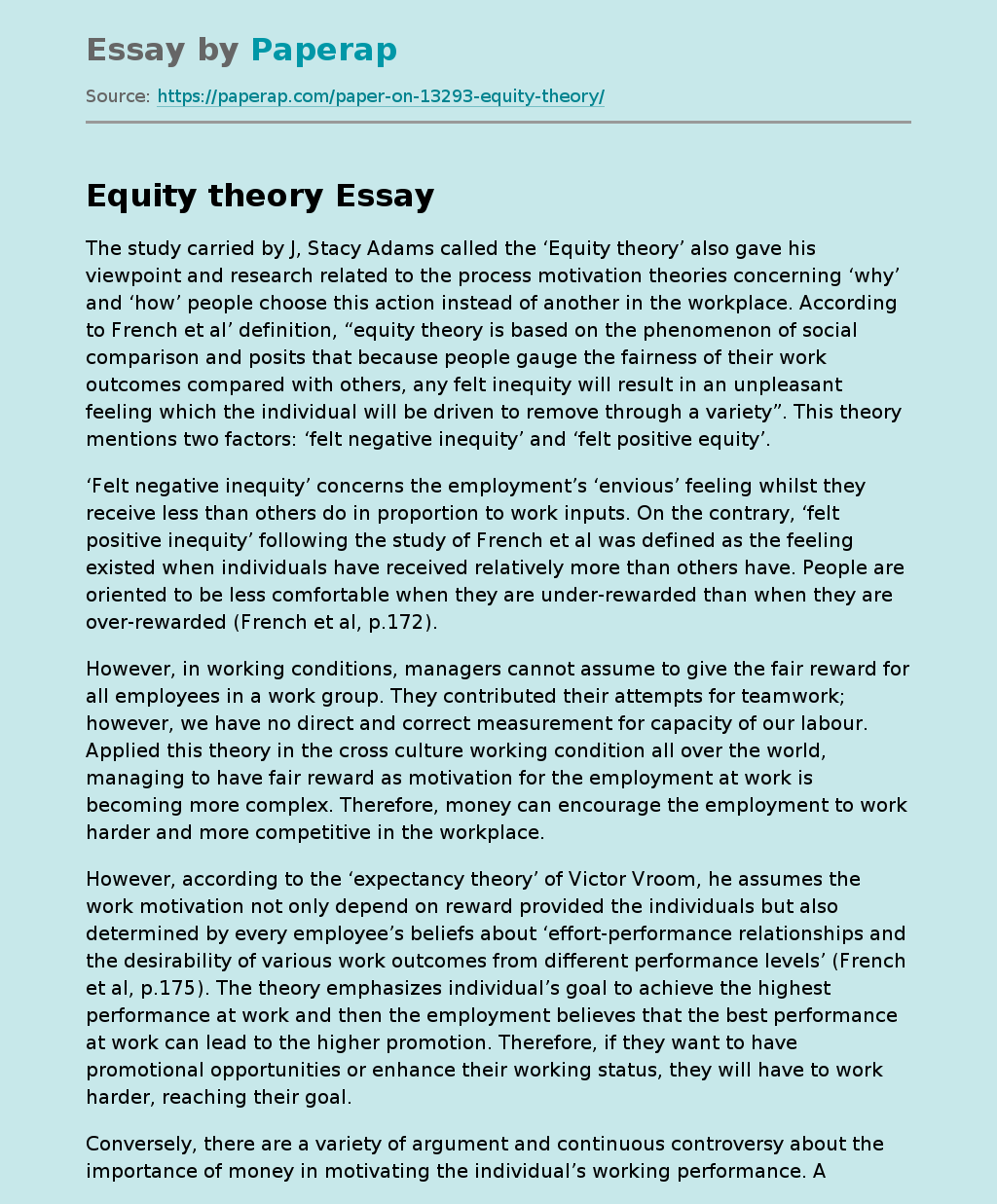J Stacy Adams' Equity Theory and Motivation Theories
The study carried by J, Stacy Adams called the ‘Equity theory’ also gave his viewpoint and research related to the process motivation theories concerning ‘why’ and ‘how’ people choose this action instead of another in the workplace.
According to French et al’ definition, “equity theory is based on the phenomenon of social comparison and posits that because people gauge the fairness of their work outcomes compared with others, any felt inequity will result in an unpleasant feeling which the individual will be driven to remove through a variety”.
This theory mentions two factors: ‘felt negative inequity’ and ‘felt positive equity’.
‘Felt negative inequity’ concerns the employment’s ‘envious’ feeling whilst they receive less than others do in proportion to work inputs. On the contrary, ‘felt positive inequity’ following the study of French et al was defined as the feeling existed when individuals have received relatively more than others have. People are oriented to be less comfortable when they are under-rewarded than when they are over-rewarded (French et al, p.
172).
However, in working conditions, managers cannot assume to give the fair reward for all employees in a work group. They contributed their attempts for teamwork; however, we have no direct and correct measurement for capacity of our labour. Applied this theory in the cross culture working condition all over the world, managing to have fair reward as motivation for the employment at work is becoming more complex. Therefore, money can encourage the employment to work harder and more competitive in the workplace.
However, according to the ‘expectancy theory’ of Victor Vroom, he assumes the work motivation not only depend on reward provided the individuals but also determined by every employee’s beliefs about ‘effort-performance relationships and the desirability of various work outcomes from different performance levels’ (French et al, p.175). The theory emphasizes individual’s goal to achieve the highest performance at work and then the employment believes that the best performance at work can lead to the higher promotion. Therefore, if they want to have promotional opportunities or enhance their working status, they will have to work harder, reaching their goal.
Conversely, there are a variety of argument and continuous controversy about the importance of money in motivating the individual’s working performance. All the theories above were thoroughly carried out and had some particular perspectives on the questions “Is money considered as a motivator for the employment in the workplace?” In fact, One experimental study shows that in England, 83% of human resources directors claims that the British youth all are significantly motivated by flexible working hours and career development progress rather than money or the bonus or reward at work while in the Far and Middle, the young employment was motivated to perform well by money and extrinsic reward at work (French et al, counterpoint, p.186).
No one can deny the important role of money in our life: the main means for us to meet all our daily needs: food, water, clothes, entertainment and other higher level of needs. We absolutely deserve a bonus payment give as an extrinsic reward for our best performance at work. However, under some circumstance, the continuous desire for money and salary appraisal at work can diminish the work ethic and materialize the meaning of working.
The manager makes advantage of money and bonus payment to control the employment’s behavior, putting pressure on them and forcing them to give the best performance. Working extra time for bonus or having no break during the working time makes the employment to lose the authentic value of life, which still concludes the family, relationships, entertainment, hobbies and enjoying their lives.
Money can be considered as a motivator at work, bringing us pride, competition at work and even society position and fulfilling our satisfaction in the workplace. However, money cannot be the only motivation in our working achievement. A variety of employees enjoy their jobs and want to reach the best performance just because they love what they do, even that work did not give them extra bonus or reasonable salary.
Succeeding in understanding about the efficiency of money to motivate the employment at work is very crucial for any managers. A successful employer should perceive the meaning of paying and have suitable strategy to give necessary and reasonable reward for their workers to enhance their capacity. With the understanding about these, manager can create a strong belief among their worker that the way to achieve a high salary is to give the highest performance. Furthermore, the implementation of payment and bonus support also help the organization to discriminate between the high and low performers to have suitable managing strategy to encourage their working ability.
Reference
1. A Dictionary of Business and Management. Ed. Jonathan Law. Oxford University Press, 2009. Oxford Reference Online. Oxford University Press. Aston University. 7 January 2012
2. American Society for Training and Development. “Companies won’t boost performance by offering rewards, says Author”, National Report on Human Resources, 1994, p. 3)
3. Dawson, P.P., Fundamentals of Organizational Behavior: An Experiential Approach, Prentice Hall, Englewood Cliffs, N.J., 1985
4. Ephraim R. McLean, Stanley J.Smits, John R. Tanner., “The importance of salary on job and career attitudes of information systems professionals” ., Information & Management 30 (1996) P. 291 – 299.
5. Herzberg, F. Mausner, B., and Snyderman, B.B., The Motivation to Work, 2nd edition., Wiley, New York, N.Y., 1959
6. Christine Lundberg., Anna Gudmundsion., Tommy D. Anderson., Herzberg’s Two – Factor Theory of work motivation tested empirically on seasonal workers in hospitality and tourism., Tourism Management 30 (2009)., P. 890 – 899.
7. Pinder, C. C. (1998). Work motivation in organizational behavior. USA: Prentice Hall
J Stacy Adams' Equity Theory and Motivation Theories. (2018, Jan 25). Retrieved from https://paperap.com/paper-on-13293-equity-theory/

